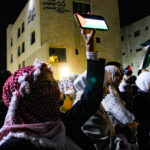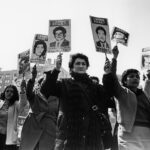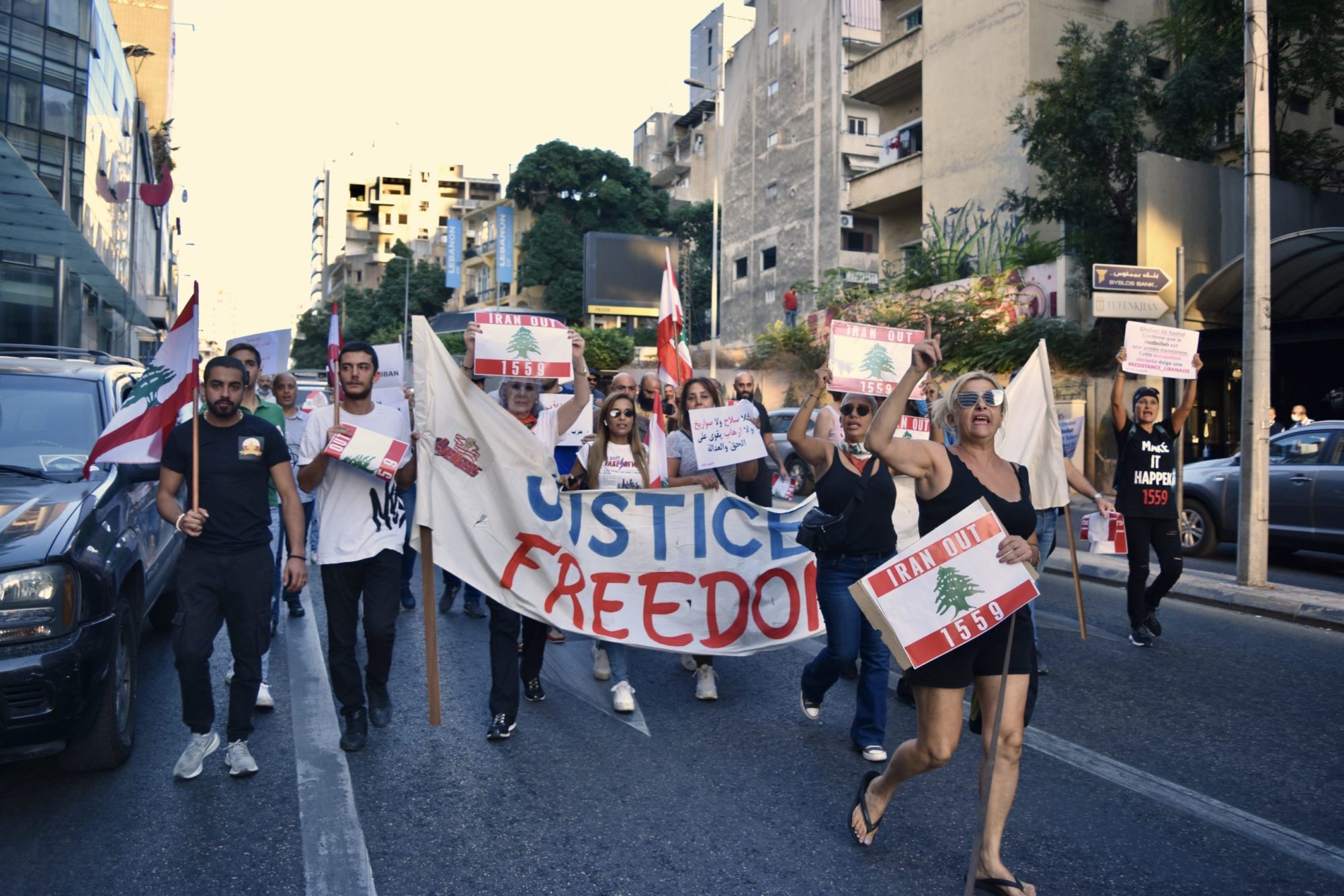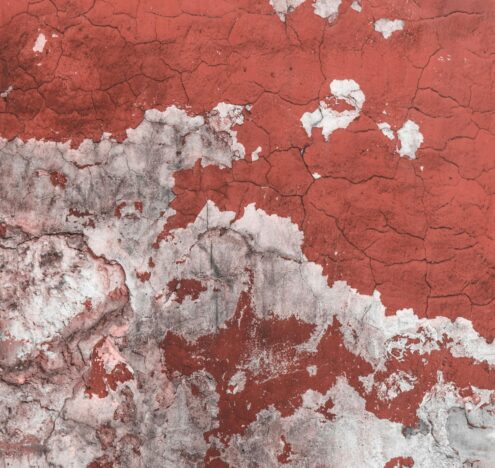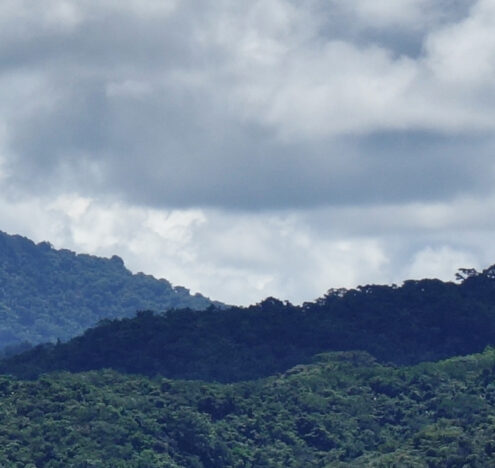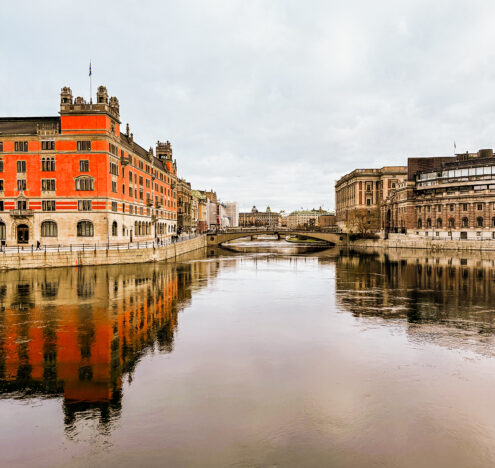Nearly three years since the eruption of nationwide anti-government protests and one of the world’s worst economic collapses, recently elected parliamentarians and critics of Hezbollah have brought to the forefront of Lebanon’s political arena their demands for the Shia political party to relinquish its arms.
Amid a host of other challenges — including rising fuel and consumer good prices, acute electricity shortages, mass emigration, hyperinflation, and more — Hezbollah’s weapons, long a controversial topic, are once again in the spotlight as Lebanon’s political establishment moves to enact reforms and secure international support to save the country from further collapse.
But with a strong — though waning, experts say — degree of popular support and backing from Iran, stripping the party of its weapons is easier said than done.
“Nobody Will Take Our Weapons”
“Nobody will kick us out,” Ali,* a 21-year-old Hezbollah fighter, said while seated on the second floor of a cafe in Beirut.
As he smoked shisha shortly before deploying for an operation in Syria, Ali dismissed criticism directed against the party.
“Nobody will take our weapons, and nobody can fight us,” he said.
Leading the charge against Hezbollah is the Lebanese Forces, a Christian party that enjoys warm relations with Saudi Arabia, the Sunni regional rival of Shia Iran. The LF views the party’s arms and its relations with Iran as a violation of the country’s sovereignty and an obstacle to widely demanded political, economic, and judicial reform.
“You cannot move forward, you cannot build a future with a party having a militia, and not only a local militia but [one] affiliated to a foreign country,” said Richard Kouyoumjian, Head of the Foreign Affairs Department of the Lebanese Forces and a former government minister of social affairs.
A History of Armament
Hezbollah’s weapons and ties to Iran date back to Lebanon’s 15-year civil war when Israeli forces invaded the country to eliminate armed Palestinian groups seeking to liberate former Palestinian territory taken by Israel. In the early 1980s, Shiites inspired and supported by Iran and opposed to the Israeli occupation formed a resistance movement that eventually gave rise to Hezbollah. In 1985, Hezbollah, or “the Resistance” as many call it, published a manifesto pledging allegiance to Iran’s supreme leader and committing to protect Lebanon and defeat Israel.
After the civil war ended in 1990, the various warring factions agreed to give up their weapons. An exception was made, however, for Hezbollah, which continued military operations against Israeli troops until Israel withdrew in 2000.
“It’s very evident that the Resistance’s arms have been able to successfully defend Lebanon,” said Hezbollah member of parliament Ibrahim Moussawi. “I won’t say that it is 100%… but now there is a kind of a deterrence equation that the Israelis cannot surmount.”
Even after Israel’s withdrawal, Lebanon’s government has repeatedly allowed Hezbollah to keep its weapons, with many arguing that the official military is ill-equipped to defend the country. “We have never had at any time a very strong army, an army that could stand up to the Israelis,” Moussawi said. “This is not about a weakness in the army itself. It is the political decision that has never given the army the green light to really defend Lebanon, not to give them the proper armament to stand up to the Israelis.”
In addition to the lack of a political green light, Moussawi accused the US — which has provided billions of dollars in aid to the Lebanese Armed Forces since 2006 — of limiting its support for the military in order to prevent it from threatening Israel and its interests. “It’s not that we want to have arms,” Moussawi said. “We want to have a strong army. Let the Americans give our army the sophisticated and high-tech weapons that could defend Lebanon.” He continued, “You know why the Americans don’t give our army the sophisticated arms that it needs? It’s because they are afraid they might use it against the Israelis.”
In the face of aggression from Israel and radical Sunni extremist groups in Syria, such as the Islamic State, and without a military deemed up to the task, Hezbollah describes its military operations as patriotic undertakings and defensive measures. “Those who are fighting to liberate their country, those who are fighting to protect their people, those who are sacrificing their lives to protect their land, defend their people, they are carrying out their honorable duty, they are exercising their very basic right against the occupation while the others [critics], they didn’t do their job, they didn’t do their duty, they didn’t exercise their rights,” said Moussawi.
Hezbollah’s Foreign Interventions
While many acknowledge that Hezbollah has helped defend Lebanon from Israel, the party’s foreign operations are viewed more cynically.
In Syria, Hezbollah helped Iranian-ally President Bashar Al Assad stay in power as he faced rebel forces and radical Sunni extremist groups like the Islamic State.
Meanwhile in Yemen, Saudi Arabia has accused Hezbollah of supporting Iran-backed Houthi rebels, who have launched attacks against the Kingdom. Hezbollah denies the allegations.
“When you talk about Yemen, Hezbollah does not have divisions in Yemen, they don’t have people fighting in Yemen,” said Moussawi.“The Yemenis have all the expertise that they need,” he continued. “They have all the expertise that they need in order to fight against the Saudis. The Saudis want to deny this in order to link Hezbollah to them, because they want to demonize Hezbollah.”
Many opponents accuse Hezbollah — which the US and allies have designated as a terrorist organization — of advancing Iranian interests at the expense of Beirut’s relations with Riyadh and other Gulf countries, which are viewed as crucial for helping Lebanon recover from its crippled state. “How are you going to get investment from outside, from the Gulf countries, which are historically the main supporters of Lebanon financially, while Hezbollah is waging wars against Saudi Arabia in Yemen, in Iraq and Syria?” Kouyoumjian asked. Late last year, Saudi Arabia and other Gulf countries severed diplomatic and trade ties with Lebanon over frustration with Hezbollah’s influence in the country. Relations have since started to return to normalcy, but many experts say that Riyadh has largely given up on the country.
Despite the tensions Hezbollah’s arms have stirred domestically and abroad, attempts to force the party to relinquish its weapons have repeatedly failed. In 2004, the United Nations Security Council passed Resolution 1559, which in part called for armed groups other than the state military to disarm.
Hanin Ghaddar, Senior Fellow at the Washington Institute for Near East Policy, said that Hezbollah will not give up its arms without orders from Iran.“Iran is the only actor that [could] actually ask Hezbollah to drop their weapons and they would, but Iran won’t [do that],” she said.
Acknowledging its own limited capabilities and the risk for conflict that attempting to force Hezbollah to disarm would provoke, Koyoumjian said the LF plans to confront Hezbollah and its weapons through political actions rather than with violence.“Nobody wants another civil war, nobody wants to disarm Hezbollah by force,” Kouyoumjian said. “But hey, we want our government back. We want our state back. And we have to stand up for those principles, even though Hezbollah has its weapon. We won’t allow them to control the state.”
While Koyoumjian pointed to the 19 parliamentary seats gained by the LF as one such victory in their political fight, the party has so far achieved little else. Parliament speaker elections in late May resulted in incumbent Nabih Berry, head of Hezbollah’s Shia ally Amal, winning a seventh consecutive term. The premiership also saw Hezbollah’s favored candidate, Prime Minister Najib Mikati, reappointed late last month. All the while, President Michel Aoun, the former head of Hezbollah’s Christian ally the Free Patriotic Movement, continues to fulfill his term, which doesn’t expire until October.
While experts say the outcome of May’s elections resulted in the loss of Hezbollah’s parliamentary bloc majority — a claim that Moussawi refutes — such political victories have reinforced a belief that the party still remains the most powerful force in the country.
Even among its allies, Hezbollah’s military operations have proven controversial.
“The reality shows you that they are able to have a majority whenever they need it,” opposition MP Paula Yacoubian said.
If such recent victories reflect an ongoing domination over the political arena, past incidents highlight the fear many critics of the party feel as they speak out against Hezbollah and its arms.
Assassination For Dissent
In early February, a mix of Western officials and Lebanese citizens gathered inside a courtyard in a pro-Hezbollah neighborhood in Beirut to commemorate the one-year anniversary of the assassination of Shia activist Lokman Slim. “Lokman stood for the rule of law,” US Ambassador Dorothy Shea said. “He was a champion of free speech, democracy, civic participation. He was never intimidated by the repeated threats made against him.” Lokman was a renowned author and outspoken critic of Hezbollah whose activism and criticism of the party prompted a strong backlash from the group’s supporters. In the months leading up to his assassination, Slim had warned that if anything happened to him, it would be at the hands of Hezbollah.
After leaving a friend’s home in southern Lebanon in the late evening of Feb. 3, 2021, Slim was found dead inside his car. Six bullet holes punctured his body, three of them to his head. A year on, the investigation into his murder remains incomplete.
A few months prior to the commemoration, Slim’s sister, Rasha al Ameer, sat on the second-floor balcony of their family home. She spoke admirably of her brother as she sipped wine. Ameer and many others suspect Hezbollah of being behind Slim’s death. “They don’t like courage,” she said. “If you are courageous, they don’t like you. If you are telling the truth, they don’t like it. They want darkness and lies.”
In a country marked by a notorious history of assassinations, Ameer’s expectations for justice are meager. After his death, Hezbollah condemned Slim’s murder, but a number of pro-Hezbollah social media accounts also celebrated his assassination.
“If you tell me this guy and this guy and this guy killed Lokman and those three guys are protected by Hezbollah, so what? Did you see Hariri? ” she said, referring to the 2005 assassination of former Prime Minister and Saudi-ally Rafic Hariri. A UN-backed international tribunal charged three assailants linked to Hezbollah with life sentences in absentia in responsibility for the killing. While Hezbollah officially denied involvement, the tribunal concluded that a senior Hezbollah military commander killed in Syria helped coordinate the attack.
Though Slim’s death was a heavy blow to loved ones, Ameer said it ultimately served to turn more people, including Shiites, against Hezbollah and that it is only a matter of time before the party falls.
“How will it happen? I don’t know,” she said. “But one day, soon, Lokman will prevail. I’m sure.”
The Complexity of Disarmament
Even among its allies, Hezbollah’s military operations have proven controversial.
In the years since Israel’s withdrawal and a month-long war in 2006, a number of rocket attacks, some attributed to Hezbollah, have been launched against Israel from inside Lebanon. As Lebanon enters tense indirect maritime negotiations with Israel over the contested offshore Karish gas field, Hezbollah has stated its readiness to use military force to defend the country’s interests. On July 3, Hezbollah flew three drones toward the Karish gas field. Israel said it shot down the unmanned aircraft, while Mikati and Lebanese Caretaker Foreign Affairs Minister Abdallah Bou Habib condemned Hezbollah’s actions in a joint statement.
Such actions enrage critics, who see Hezbollah, rather than the Lebanese state, as being the arbiter of peace and war.
“No one can deny that Lebanon is in a stronger position vis-a-vis Israeli attacks because of the existence and the work of the Resistance,” said Martine Najem Kteily, Vice President for Management Affairs of the Free Patriotic Movement. “But we all agree also that this needs to be organized differently.”
While acknowledging Hezbollah’s right to self-defense when it helped repel Islamic State fighters and other radical Sunni extremist groups entering Lebanon from Syria, Kteily said the FPM opposes the party’s military operations in more distant locations like Yemen. “This is an engagement in other countries’ affairs which we don’t approve,” she said.
Kteily noted that the FPM has suggested a national dialogue for developing a revised national security strategy, which would address the controversy surrounding Hezbollah’s weapons while also capitalizing on the strengths it offers. Such an approach, Kteily said, is the only peaceful solution.
It may also be the only option.
“Honestly, I don’t know what the solution is,” Yacoubian said. “But I’m sure that the solution is not just Lebanese, these arms are not Lebanese. This is an international and a regional issue. I cannot solve it myself, not my political party, not even if all of us get together against them.”
While she opposes Hezbollah’s arms, Yacoubian rejects the argument put forward by the LF that the party’s weapons must be addressed before confronting other issues plaguing the country. “Everything should go together, everything is a priority,” she said. “But my problem with those saying that we have to stop everything in life and just focus on the illegal arms — my question for them… [is,] what are you going to do about it? Are they going to wage war against Hezbollah? What are they suggesting? There is no suggestion today when it comes to the arms of Hezbollah except this lip service.”
Though enjoying warm ties with Saudi Arabia, the LF does not receive the same degree of support from the Kingdom as Hezbollah does from Iran, which the US has estimated as $700 million in annual aid. This is partly because Riyadh has lost interest in Lebanon as it shifts more focus toward Gulf security, Ghaddar said.
With no Lebanese actor able to challenge Hezbollah, Ghaddar said de-arming the party will require continuous domestic dialogue, clear and focused international policy, and significant change in Iran. “All of this combined will create the regional and local circumstances to actually deal with these issues,” she said. “No one alone can do it. But all of these together can work.”
But to Hezbollah’s supporters and members, nothing will shake the party.
“Nobody controls us,” Ali, the Hezbollah fighter, said. “We control the world. Anyone who comes to fight us, we will fight him, and we will beat him. From anywhere, we will kill them. They want Hezbollah out because they think Hezbollah is a problem and they think if Hezbollah gets rid of its weapons or stops fighting, the country will be good. No, if Hezbollah does this Israel will come and take [Lebanon].”
As night settled over the dimly lit streets of Beirut, Ali took another puff from his shisha.
“Until we die, until the world ends, we will stay strong.”
Photo: Demonstrators carry signs and banners calling for Hezbollah to disarm and for Iranian influence to be expelled from Lebanon during protests.
*Ali, the Hezbollah fighter requested to use a pseudonym for his protection.










